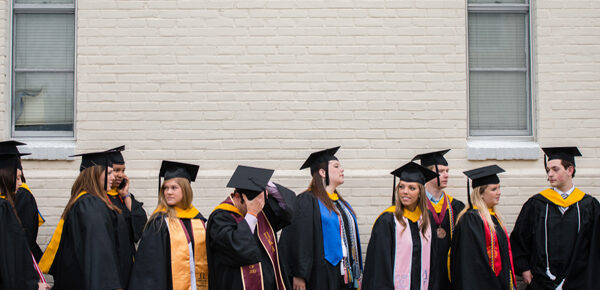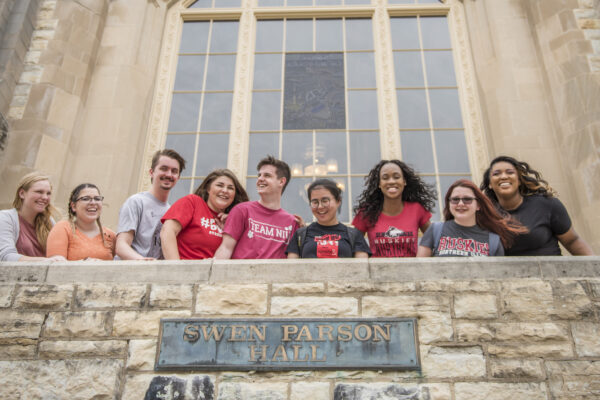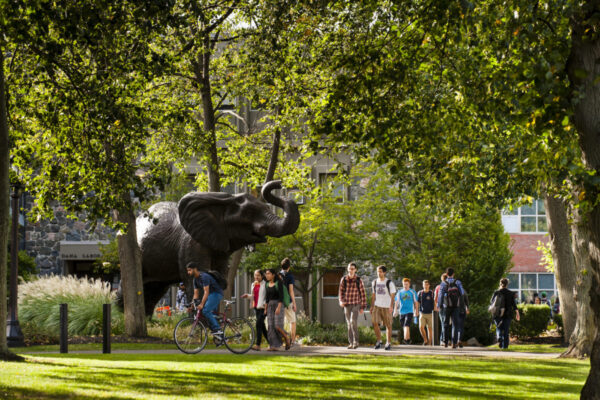Across the University of California (UC) system, 42 percent of undergraduate students are the first in their family to attend college. To better serve this large and growing “first-gen” population and help build their sense of belonging on campus, UC has launched a system-wide First-Generation Faculty effort to connect these students with faculty mentors who have walked in their shoes. Nearly 900 UC faculty have signed on to participate in the campaign.
Launched first at UC Irvine in the fall of 2016, the work is now underway at all UC campuses. During the first week of classes this fall, as historic numbers of first-generation students arrive on campus, faculty across UC will don t-shirts and pins identifying themselves as the first in their family to graduate from college.
By raising awareness about first-generation faculty and students on campus, the coordinated outreach and mentorship effort seeks to connect first-gen students with critical on-campus resources including professors, study groups, faculty office hours and tutoring services. For example, on UC Santa Cruz’s campus, the 54 faculty participating include the director of the Chicano Latino Research Center and the interim vice provost for student success. Many UC campuses, including UC Santa Cruz, have already engaged with current first-gen students to compile resources for their fellow students.

UC System President Janet Napolitano told Inside Higher Ed that the program reflects system-wide goals: “UC aims to connect first-generation students with the tools necessary for academic success, to foster a sense of belonging and ownership among this critical student population, and to ensure that UC continues to serve as an engine of economic mobility for our diverse population of undergraduates.”
Martin Berger, UC Santa Cruz’s interim vice provost for academic affairs, indicated that enabling upward mobility is a vital part of what this program aims to achieve.
“It is one of the most important things that the United States should be doing in the twenty-first century,” Berger said about the mentorship efforts on that campus. “In order to unlock the full potential of the country you need to do more than educate the same elite population generation after generation. Doing so limits our ability to innovate and problem solve. The more heterogeneous our approach, the more creative our solutions.”
At a Glance
ACE Member Institutions: University of California, (UC) Office of the President; UC, Berkeley; UC, Davis; UC, Irvine; UCLA; UC, Merced; UC, Riverside; UC, San Diego; and UC, Santa Cruz.
Initiative: UC First-Generation Faculty Project
Goals:
- Raise awareness about first-generation students at UC, recognizing the challenges and strengths they have as well as the unique gifts they bring to the university;
- Connect first-generation students with first-generation faculty members, who identify themselves as potential role models and allies, boost new students’ sense of belonging, and show students they are capable of achieving at the highest levels;
- Help first-generation students identify and make strategic use of campus support services, such as study groups, faculty office hours, and tutoring services;
- Build a network of allies with shared interests and a common goal in support of first-generation students.
Become a member: As a member of ACE, you join nearly 1,800 organizations that collectively promote, protect and advocate for students, faculty and administrators in higher education. ACE is the most visible and influential higher education association in the nation, and we are at the center of federal policy debates concerning legislation that affects campuses across the country. See more on the ACE website.
If you have any questions or comments about this blog post, please contact us.


